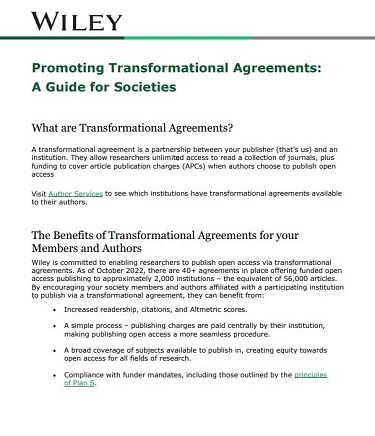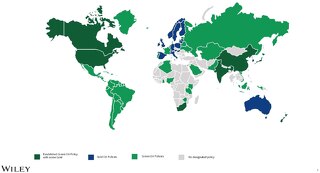new-author-name-change-policy-supports-a-more-inclusive-publishing-environment
January 15, 2021
We are proud to announce that Wiley has updated its author name change policy to support the anonymity of authors who wish to change their name on already-published research. We are removing two standard and historical processes when an author submits a name change. We will no longer publish a correction notice to the updated paper when there is a name change, and we will no longer notify co-authors of their colleague’s name change. We will update and republish the paper, and redeliver the updated metadata to indexing services. We also will not require that authors provide proof or documentation of their name change. The policy change is effective immediately for all of our 1,700 research journals.
Your response to this policy change might range from: why do authors need anonymity, to why are authors trying to change the historic record, to why wasn’t this always the policy?
Why anonymity matters
Changing our name represents a milestone, whether it’s because of gender identity, religion, or relationship status. And changing names requires discretion and sensitivity, especially in the case of transgender (including non-binary) authors.
Logistically, changing a name isn’t easy. Trans people need consistent identification for bank accounts, jobs, school, and travel, but the process is complex and expensive. According to the National Center for Transgender Equality, “gender incongruent identification exposes people to a range of negative outcomes.” Public disclosure of an individual as trans is invasive and can lead to real harm, including social, psychological, professional, and economic harm. An inclusive publishing environment doesn’t harm people, it supports everyone. And that means empowering authors to own their name change process.
To ensure that our policy is serving the needs of the trans academic community in the best possible way, a global community of transgender and non-binary authors, including Wiley colleagues, were involved in the development of the policy update from start to finish.
Challenging the idea of “what’s published is published”
An author’s published body of work is often the basis for their professional growth. It is discriminatory to allow that work to be divided across multiple records when a name change is involved. For example, many trans academics were previously forced to out themselves in every grant and job application if the name in their publication history didn't match. Coming out should always be a personal choice. Wiley’s new policy puts this power back into the hands of the author, where it belongs.
Name change policies make sure that an individual’s entire bibliography is attributed to the same name. That change can happen without automatically issuing corrections or notifying co-authors. A name change is for the individual: it affirms who they are, and it represents a significant milestone. Changing the public record allows authors to easily access their work and to consistently be cited.
Why this wasn’t always the policy
Like every other industry, we are certainly not immune from bias, and we have a responsibility to review and amend processes that no longer serve the needs of our diverse research community.
Wiley’s previous policy has accommodated post-publication name changes for our authors, but the policy—designed with the integrity of the historic record in mind—must be more sensitive to author needs. We appreciate that by notifying co-authors, the previous policy might have put the requesting author in an uncomfortable situation to disclose sensitive personal information.
As we learned more about our trans authors and the challenges they face in changing their names, we knew the policy had to change.
The urgency for a policy update became particularly clear after many from the trans academic community united as a group to better amplify the necessity of an inclusive name change policy last summer. We consulted this group of transgender researchers, who have successfully advocated to other publishers to implement new policies.
One member of that group is Irving Rettig, a chemistry Ph.D. candidate at Portland State University. “I’m so pleased with the work Wiley has done to ensure that trans authors were involved at every stage during their policy reconstruction”, says Rettig. “Growing support from large publishers like Wiley really helps us apply pressure to publishers who have been reluctant to engage in these discussions. Right now, the publishing landscape is changing in a profound way; before, cisnormative biases informed academic publishing practices and created barriers for trans authors. Now, they are working alongside us to support and uplift our academic excellence in the way that we have always deserved.”
The research community must continue to deepen its commitment to greater inclusivity. An open, supportive and inclusive research environment must be a priority for all involved in the development and dissemination of research. We hope that our fellow publishers, and the industry as a whole, will join in adopting similar changes so we can drive meaningful and long-lasting change together.











